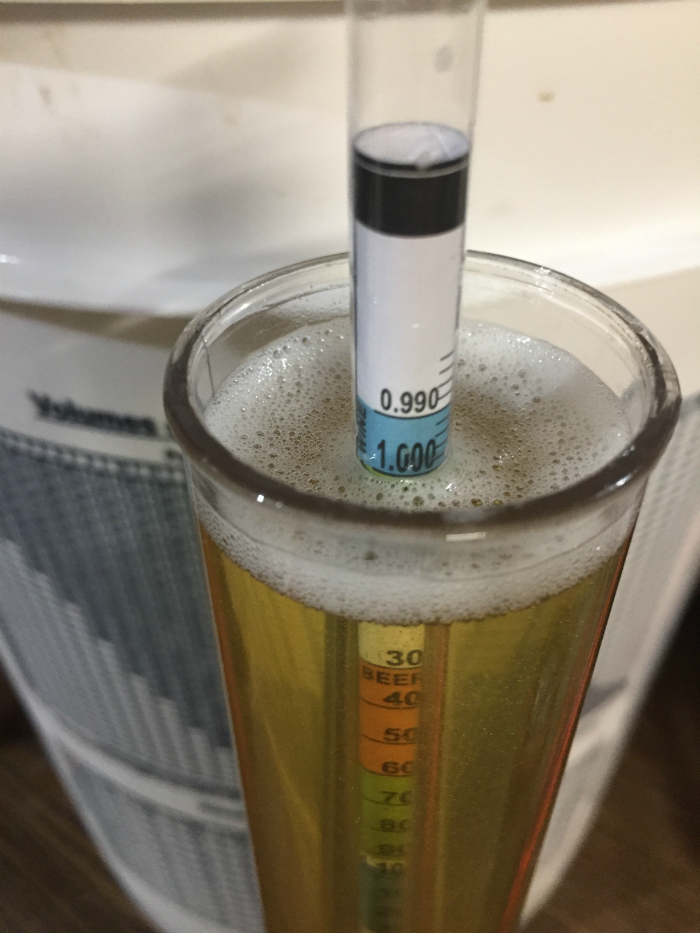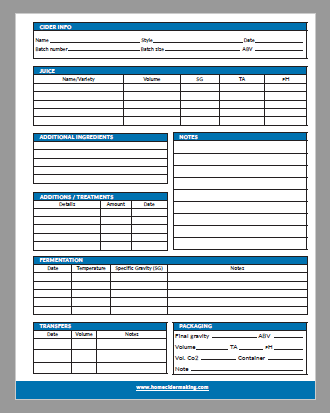One piece of equipment that makes cider making seem like a chemistry experiment is the hydrometer. When fermenting cider, a hydrometer is used to measure the specific gravity, or sugar content, of the sweet cider before fermentation and alcoholic cider after fermentation is complete. This data is used to calculate the estimated alcohol by volume of our final hard cider.
Hydrometer Terminology
Hydrometer- Tool to measure the specific gravity of a solution
Specific Gravity- The ratio of the density of dissolved sugar to the density of water in cider
Original Gravity- Specific gravity of the cider before fermentation
Final Gravity- Specific gravity of the cider after fermentation

What is a Hydrometer?
The hydrometer measures the specific gravity of a solution and tells us the amount of dissolved sugar in our sweet cider (original gravity) and how much is remaining in our hard cider after fermentation (final gravity). Any measurement in between the original gravity (OG) and the final gravity (FG) tells us about the progress of fermentation because the sugars are being consumed by the yeast which is producing CO2 and alcohol. This causes the specific gravity to lower as the cider completes fermentation.
Cider Example:
Original Gravity (OG): 1.046 sg
Final Gravity (FG): 1.010 sg
Alcohol By Volume (ABV): 4.73%
When an alcohol hydrometer is placed in pure water the specific gravity reading should be 1.000. A sweet cider will generally have an OG around 1.040-1.055 depending on the blend of apples used. The sweeter the juice, or more sugar you add, the higher the specific gravity.
The original gravity of sweet juice can be used to calculate the potential alcohol of a cider by using an ABV calculator. You will have to guess what your final gravity reading will be based on the yeast used. Some ale yeast can finish as high as 1.010 while a champagne yeast may finish very dry near 0.990.
Once fermentation has ceased, the original gravity and final gravity can be entered into an ABV calculator to accurately calculate the final alcohol of the hard cider. This can also provide insight into how sweet or dry the finished cider will be.
How to Take a Hydrometer Reading:
- Sanitize all equipment before beginning
- Fill a test cylinder with a sample of cider
- Place the hydrometer into the cider and give it a slight spin
- Take reading where the surface of the cider intersects the scale
- Document the specific gravity reading on a Cider Log
- Discard or consume the sample; do not pour it back into the main fermentor
Note: Many hydrometers in the USA are calibrated at 60 degrees Fahrenheit. Check the calibration temperature for your hydrometer and cool or heat your cider to get consistent measurements. If your cider is not at the calibration temperature, consult a temperature correction table or calculator to adjust your reading.
Hydrometer Temperature Correction Formula
MG = measured gravity
TR = temperature at time of reading
TC = calibration temperature of hydrometer
CG = MG * ((1.00130346 – 0.000134722124 * TR + 0.00000204052596 * TR – 0.00000000232820948 * TR) / (1.00130346 – 0.000134722124 * TC + 0.00000204052596 * TC – 0.00000000232820948 * TC))



Hello, how do I subscribe to your newsletter
Hi Gareth,
There is a sign-up form on the homepage that you can use. I plan to send out an updated Cider Log and a Cider Journal page to my subscribers soon so keep an eye out for updates!
Thank you for bringing that to my attention, I’ll add one to the sidebar so it is more accessible!
Cheers!
If all equipment is sanitized, why does the sample used for the hydrometer reading need to be discarded?
It’s been taken out and exposed to air. Given how little you’d save by pouring it back in, it’s not worth the risk of contamination.
This is a great site!